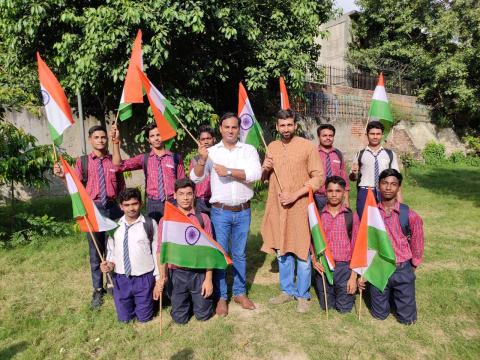
As I look at my relationship with my country.
In the midst of the euphoric milieu of our national festival, it is difficult to pause and reflect upon our love for our country. However, this is also a time when we ought to reflect on what DeshBhakti really means. What does freedom mean to me? In what ways do I view my relationship with my country and my fellow citizens?
In this article, I will answer some of the questions which I ask myself. Everyone faces this question at some point in their lives. Some choose to answer it through euphoria, and some engage with it. As a result of engaging with these questions, one feels both a sense of glory and disappointment at the same time.
The approach to looking at this question is important. For space scientists, seeing the earth in a blue spherical shape amidst other stars and planets is the reality. For the rest of us, it’s justified true belief. When a person leaves the soil of a country to which he or she belongs, the sense of belonging to that country becomes stronger. Fortunately, I had this opportunity. I have sensed it, I have felt it strongly from the foreign soil. An automatic process of conceiving the idea of the country begins the moment we land on foreign soil. In our minds, we compare the trees, the food, the people, the clothing, the politics, the language, the culture, the roads, etc. This process helps one understand what belonging to a country means. It’s a sum total of our unique identity.
Since it's a unique identity, it is deeply attached to one’s cognitive and emotional system. We hardly find a person who doesn’t love his/her country. Love for one's country is a universal phenomenon. When we explore the literature of a country, we find an emotional bond between people and their respective countries. I think, there isn’t an issue in respecting the love of people for their respective countries.
The next paragraph shows how I feel proud of my country.
I belong to a country named…A wonder that is India. I agree with this phrase of the renowned historian, A.L Basam. I have just changed the tense from Was to Is. In my opinion, there is no other place on earth where you have such long and diverse histories, a multicultural identity, a multiethnic identity, a religious pluralism, a strong democratic tradition, linguistic diversity, geographical expanse, climatic vividness, and intellectual and philosophical traditions. I could only capture a few points. There are amazing books that help us understand the wonder that is India. I would like to mention J.L Nehru's book, the Discovery of India. It has deeply shaped my thinking of what India is. Of course, there are other books. In an article, “What to read as an Introduction to India”, The Economist has given a list of six books. These books are
- Mahabharta. By C. Rajgopalachari
- India in the Persianate Age: 1000-1765. By Richard M.Eaton
- Inglorious Empire: What the British did to India. By Shashi Tharoor
- India after Gandhi. By Ramchandra Guha
- Behind the Beautiful Forevers: Life, Death and hope in a Mumbai Undercity. By Katherine Boo
- The Billionaire Raj: A Journey through India’s New Gilded Age. by James Crabtree
There is no question that there isn't a country like India on this planet. It is the recognition of our challenges that distinguishes reflection from euphoria. The news that a child was beaten to death because of his caste identity is particularly poignant on the 75th anniversary of our independence. Our head hangs in shame. Some of the gravest challenges we face are religious hatred, extreme economic inequality, and violence against women. We have overcome many challenges together. I have faith that together we will face these challenges and will find the solutions. I have a strong belief in the people of India.
- Log in to post comments
